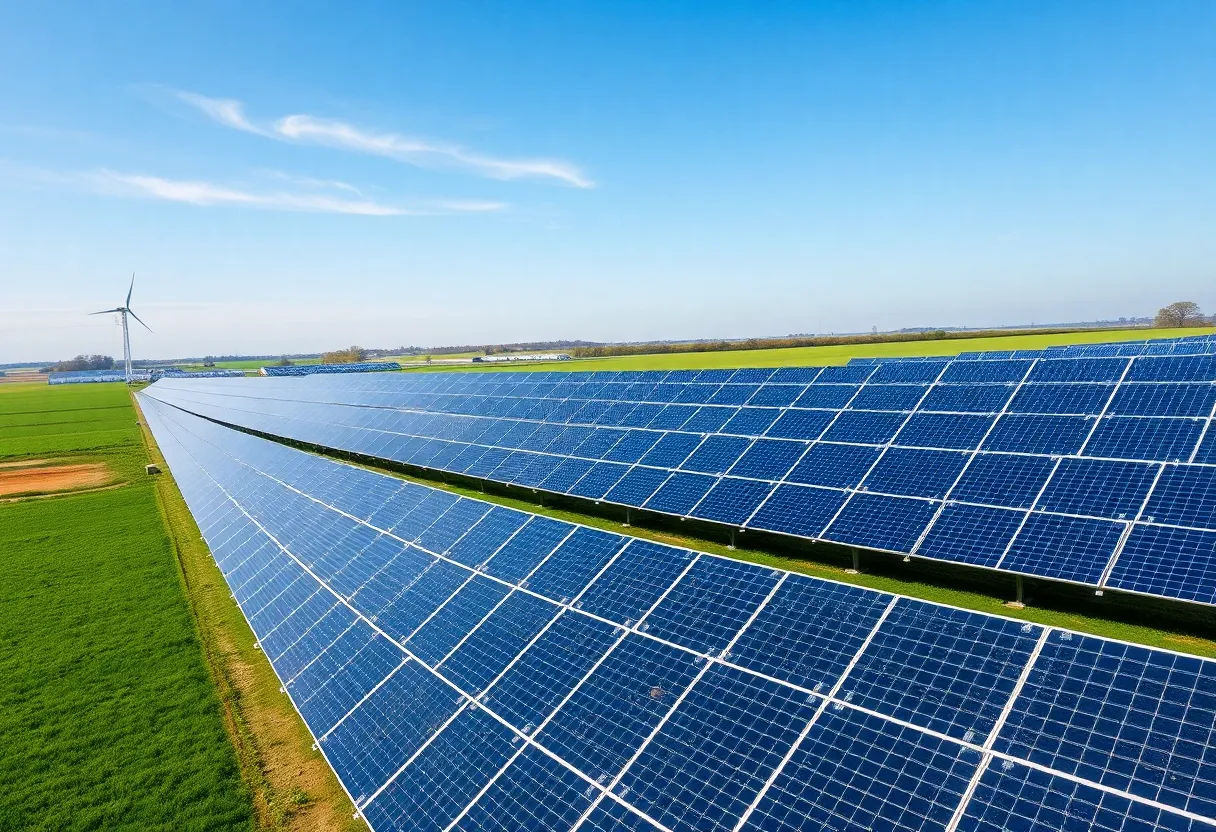News Summary
Rhode Island has launched the Exeter Mail solar farm with a capacity of 6.5 megawatts, aimed at providing affordable solar energy to public housing authorities. This project represents a significant step toward achieving 100% renewable energy by 2033. Collaborative efforts between Nautilus Solar Energy and Veolia highlight the importance of community solar projects, making solar access possible for low and medium-income households. As electricity prices rise, this initiative is projected to save over $35 million in energy costs over the next 20 years.
Rhode Island has taken a significant step towards its renewable energy goals with the dedication of the Exeter Mail solar farm, a facility with a capacity of 6.5 megawatts. The project, dedicated on September 12, 2025, is designed to provide solar energy to nine public housing authorities across the state, significantly aiding in offsetting energy costs and consequently lowering energy prices for residents.
The Exeter Mail solar farm represents a collaborative effort between Nautilus Solar Energy and Veolia. This community solar installation aims to allow multiple households who cannot install solar panels on their properties to benefit from solar power, promoting equitable access to renewable energy solutions. Community solar projects play a crucial role in extending the advantages of solar energy, particularly for individuals in low and medium-income neighborhoods.
As of late 2024, Rhode Island boasts at least 65 large-scale solar PV projects, totaling nearly 400 megawatts of capacity. The renewable energy generated from these installations could match the annual electricity consumption of between 50,000 to 80,000 households. The state has set an ambitious goal to achieve 100% electricity from renewable sources by 2033. Notably, Rhode Island has a technical electricity generation potential exceeding 3 million MWh from rooftop solar, of which approximately 1.3 million MWh exists within low and medium-income neighborhoods.
The ongoing rise in electricity prices—up by 65% since 2010—has highlighted the necessity for more sustainable energy solutions. Economic dependence on natural gas for power generation has led to instability and volatility in electricity markets, accentuating the urgency of transitioning to renewable energy. In this context, the completion of the Exeter Mail solar farm is pivotal, particularly as it is expected to save over $35 million in energy costs over the next 20 years.
Despite the progress, the future of federal funding for renewable energy projects remains uncertain. Recent developments indicate that construction of the Revolution Wind project has resumed following court permissions; however, there is concern regarding the potential cancellation of this project and the impending end of the federal Residential Clean Energy Credit at the end of this year, which could pose barriers to further solar adoption in the state.
Rhode Island currently offers rebate and incentive programs for solar installation through its Office of Energy Resources. The existing federal tax credit provides a 30% rebate on solar system costs, which enhances the affordability of solar energy for households and businesses alike. The average electricity rate in Rhode Island stands at approximately 27.50 cents per kilowatt-hour, making the switch to renewable energy not just environmentally beneficial but also economically favorable over the long term.
The state’s commitment to renewable energy, as evidenced by the completion of the Exeter Mail solar farm and the proliferation of community solar projects, reflects a determined path towards energy independence and stability. Currently, seven other community solar projects are operational in Rhode Island, primarily located in Providence and Bristol. This indicates a significant demand for further infrastructure to encourage the wider adoption of solar energy technology across various communities.
As Rhode Island navigates its renewable energy landscape, local installations like the Exeter Mail solar farm symbolize hope and opportunity for addressing the challenges posed by rising energy prices and ongoing market volatility. By fostering collaborations and advancing innovative energy projects, the state is making strides toward a sustainable energy future, aiming to set an example of how community engagement and strategic planning can lead to substantial long-term benefits in the energy sector.
Deeper Dive: News & Info About This Topic
- Rhode Island Current: Solar Policy Gaps
- Solar Power World: Rhode Island Solar Portfolio
- Globe Newswire: Agilitas Energy Expansion
- UpriseRI: High Energy Costs and Solar Adoption
- Wikipedia: Solar Energy in the United States

Author: STAFF HERE PROVIDENCE WRITER
The PROVIDENCE STAFF WRITER represents the experienced team at HEREProvidence.com, your go-to source for actionable local news and information in Providence, Providence County, and beyond. Specializing in "news you can use," we cover essential topics like product reviews for personal and business needs, local business directories, politics, real estate trends, neighborhood insights, and state news affecting the area—with deep expertise drawn from years of dedicated reporting and strong community input, including local press releases and business updates. We deliver top reporting on high-value events such as WaterFire, Rhode Island International Film Festival, and Rhode Island Comic Con. Our coverage extends to key organizations like the Greater Providence Chamber of Commerce and Providence Warwick Convention & Visitors Bureau, plus leading businesses in finance and manufacturing that power the local economy such as Citizens Financial Group and Textron. As part of the broader HERE network, we provide comprehensive, credible insights into Rhode Island's dynamic landscape.





